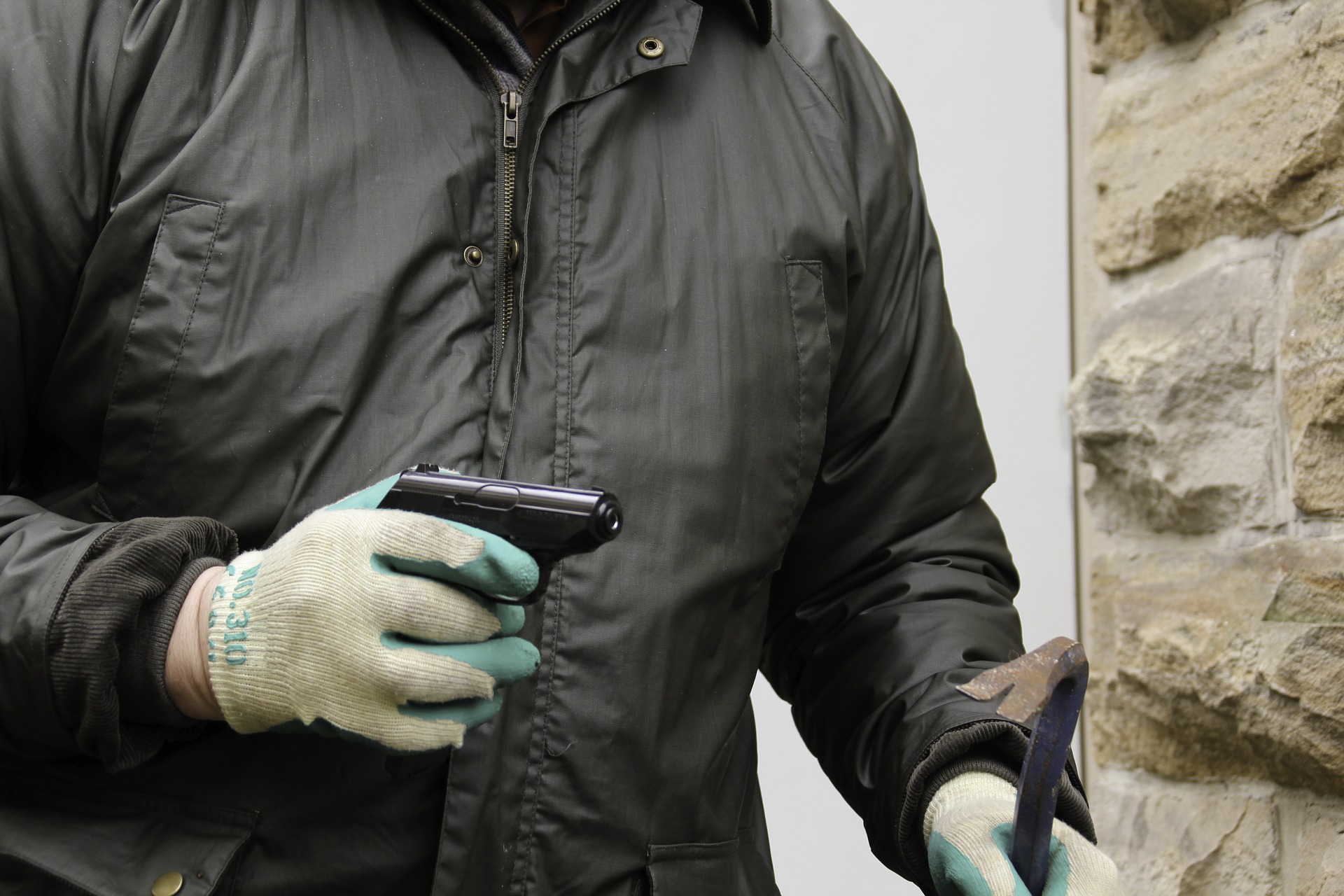State Burglary Laws

Burglary and robbery are often confused or used interchangeably, but each constitutes a different crime. One of the main differences between the two crimes is that a robbery can take place anywhere, while burglary involves illegally entering a structure. Both crimes are two of the most commonly committed felonies.
The third crime in this category is theft. For a robbery to take place, the victim must be nearby. In the case of theft, the victim is not close by, and the theft has taken place without someone breaking into a building. Theft is usually regarded as a misdemeanor.
Definition of Burglary
Burglary is defined as the unlawful entry into a structure with the intent to commit a crime. If intent can be proven, the perpetrator technically does not have to commit a crime in addition to the unlawful entry to be convicted of burglary.
Most states have updated their laws to broaden the definition of illegal entry. It used to be that burglary began with “breaking and entering,” but that is no longer the case. Even if you do not use force or physically break into a home, you can still be accused of illegal entry. Updated examples include using threats or deception to gain entry.
The intent of the unlawful entry does not always have to be theft, as many assume. Burglary charges can stem from unlawfully entering a physical structure with the intent to commit any crime at all. Burglary laws have also been updated to include all structures, not just residential dwellings. These structures include private facilities, businesses, offices, industrial buildings, or even a shed.
In some states, having “burglar’s tools” will be enough to prove intent and be convicted. When intent cannot be proven, the burglary charge typically is reduced to a trespassing charge.

Burglary Laws by State
Burglary is a crime with punishments that vary widely depending on state law. While it is almost always considered a felony, each state has varying degrees of penalties. Although punishments will vary, most states define their degrees of burglary the same.
The difference between third-degree and second-degree burglary is whether there are occupants in the building at the time of the crime. First-degree burglary is when the perpetrator is armed, uses violence, or threatens the use of force. Below is a quick rundown of each state’s punishments for burglary.
Alabama
Burglary in the third degree in Alabama is considered a Class C felony at a minimum and carries a punishment of at least one year in prison with a maximum of ten years and up to $15,000 in fines. Burglary in the second degree is a Class B felony with a prison sentence that can reach 20 years and fines of up to $30,000. Burglary in the first degree in Alabama can put you in prison for life with penalties up to $60,000.
Alaska
Burglary is considered a Class C felony in Alaska and is punishable by up to five years in jail and fines up to $50,000. First-degree burglary is a Class B felony, which will result in penalties up to $100,000 and a prison sentence for as long as ten years.
Arizona
Arizona has a broad range of burglary laws from a Class 6 felony down to a Class 2 felony. Possession of burglary tools is the least severe and considered a Class 6 felony. Burglary in the third degree is a Class 4 felony, and burglary in the second degree is a Class 3 felony. First-degree burglary is a Class 3 felony when committed on commercial grounds and a Class 2 felony when the dwelling is residential.
Arkansas
Arkansas begins by punishing breaking and entering as a Class D felony, which comes with jail time up to six years and a fine as high as $10,000. Commercial burglary is a Class C felony that comes with three to ten years in jail and a fine that can reach $10,000. A Class B felony is residential burglary, with punishments ranging from five to 20 years in prison and up to $15,000 in fines. Lastly, aggravated residential burglary is a Class Y felony with a wide range of prison sentences, from ten to 40 years, or even up to life in jail.
California
Burglary in the first degree in California has prison sentences ranging from two to six years in jail. If you use explosives, jail time increases to three to seven years.
Colorado
Any home invasion or burglary in the first degree is a Class 3 felony in Colorado. Punishments range from four to 12 years in jail and fines, which can reach as high as $750,000.
Connecticut
A home invasion in Connecticut is a Class A felony with severe punishments ranging from ten to 50 years in jail, or 25 to life in prison with fines up to $20,000. Burglary in the first degree is considered a Class B felony with a sentence of one to 40 years in prison and fines up to $15,000.
Delaware
First-degree burglary is a Class C felony in Delaware that can be punished with up to 15 years in prison. Second-degree burglary is a Class D felony with a jail sentence of up to eight years. Home invasion comes with the most severe penalties as a Class B felony with two to 25 years in jail.
Florida
In Florida, vehicles are specified as a separate type of burglary crime. Burglarizing an unoccupied vehicle, possession of burglary tools, and cutting a phone or power line are all felonies in the third degree. These crimes come with jail sentences up to five years and fines up to $5000. Home invasion and burglary of an occupied car are second-degree felonies with up to 15 years in jail and fines as much as $10,000. Armed or violent burglaries can put the perpetrator away for life.

Georgia
Any minor form of burglary or possession of burglary tools is a felony in Georgia with jail sentences of one to five years. Home invasion is punishable by up to 20 years in jail.
Hawaii
Burglary or unauthorized entry in the first degree are both Class B felonies with jail sentences up to 10 years. Burglarizing a dwelling during an emergency is considered a Class A felony with up to 20 years of jail time.
Idaho
Burglary law in Idaho is simple: commit it, and you can receive one to ten years in jail. If you use explosives, the prison sentence ranges from ten to 25 years.
Illinois
In Illinois, burglary is a Class 2 felony with three to seven years in jail. Illinois specifies burglary of residences, schools, daycare centers, or places of worship as Class 1 felonies with four to 15 years in prison.
Indiana
Burglary in Indiana is regarded as a level 5 felony at a minimum with two to eight years of jail time. Home invasion burglary is a level 4 felony with two to 12 years in jail, while burglary resulting in injury is a level 3 felony with six to 20 years in prison. A level 2 felony is burglary that causes serious bodily harm (ten to 30 years in jail), and a level 1 felony is a home invasion that results in injury (20 to 50 years in prison).
Iowa
Iowa defines burglary as entering into an occupied structure unlawfully to commit a felony or theft. Burglary in the third degree is the least severe and can be bumped down to an aggravated misdemeanor or be considered a Class D felony. Burglary in the second degree is illegally entering an occupied structure while no one is there while in possession of a gun or explosive and is a Class C felony. First-degree burglary is a Class B felony, which is when people are in the building, and a weapon is present, or injury is caused.
Kansas
If you have no criminal record, you may get off without a felony charge in Kansas. The lowest punishment in Kansas for a first-time offender is 12 months of probation. But if someone was in the building, it becomes aggravated burglary, which is a felony.
Kentucky
In Kentucky, burglary laws are simple. Unlawfully enter a building and cause injury or carry a weapon, and you’ve committed first-degree burglary. Second-degree burglary is illegally entering a dwelling, while third-degree burglary is unlawfully entering any other type of building.
Louisiana
Louisiana separates its burglary charges into two areas: simple burglary and aggravated burglary. It becomes aggravated if you have a weapon or cause injury, and the punishment is one to 30 years in jail. Simple burglary is unlawfully entering a dwelling, vehicle, or any other structure with the intent to commit a crime and is punishable by as little as a $2000 fine, or as much as the fine plus up to 12 years in jail.
Maine
Burglary in Maine starts as a Class C crime and moves up to a Class B crime if it’s a home invasion or injury is caused. It can also be increased to a Class B crime if the perpetrator has a criminal record.

Maryland
Burglary is a felony in Maine starting with a third-degree offense, which is punishable by up to ten years in jail. A second-degree burglary takes place in a storehouse with the intent to commit theft, violence, or arson and is punishable by up to 15 years in jail. A home invasion is considered a first-degree felony and comes with a sentence of up to 20 years in prison.
Massachusetts
Massachusetts has strict burglary laws, which include imprisonment for up to 20 years, even if the dwelling was empty. If the residence is occupied, the sentence is ten years to life in jail.
Michigan
Michigan is much more lax when compared with Massachusetts. Typically burglary comes with a sentence of up to ten years in jail. If it was a home invasion, circumstances could increase that from five to 20 years in prison.
Minnesota
In Minnesota, the only time burglary is not a felony is when the structure is not a dwelling, a bank, or a pharmacy, and the intent was to commit a misdemeanor other than theft.
Mississippi
Home invasion in Mississippi comes with a sentence of three to 25 years in jail, with increased jail time, depending on if other people were present. Burglary of a house of worship begins with a jail sentence up to 14 years, and burglary of an office or vehicle comes with up to seven years in jail.
Missouri
Typically, burglary in Missouri is a Class C felony with a sentence of up to seven years in jail. Committing first-degree burglary is a home invasion or causing injury and is a Class B felony with punishments ranging from five to 15 years in prison.
Montana
In Montana, possession of burglary tools or trespassing in someone else’s vehicle is not a felony. Simple burglary can result in up to 20 years in jail and fines as high as $50,000, while aggravated burglary brings the same penalties and up to 40 years in prison.
Nebraska
Nebraska is one of the few states holding on to the “breaking and entering” definition of burglary. When burglary is committed, the punishments can range from one to 20 years in jail and fines up to $25,000. Lesser crimes are first- and second-degree criminal trespass, both of which are misdemeanors.
Nevada
Burglary is straightforward in Nevada. It’s classified as a Category B felony with punishments ranging from one to ten years in jail. If the charge is aggravated burglary, the penalty increases to up to 15 years in prison.
New Hampshire
Burglary is either a Class B or Class A felony in New Hampshire. Class B is elevated to Class A if the offense occurs at night, causes injury, or involves possession of a deadly weapon. Class A felonies can include sentences up to 20 years in jail.
New Jersey
Simple burglary comes with a punishment of three to five years in jail, while aggravated burglary is punishable by five to ten years of jail time in New Jersey.
New Mexico
Home invasion burglary in New Mexico is a third-degree felony with a punishment of up to three years in prison. Aggravated burglary is a second-degree burglary with sentences reaching nine years of jail time.
New York
Third-degree burglary in New York is a Class D felony that delivers up to seven years in jail. Burglary in the second degree is a Class C felony with a sentence up to 15 years of jail time. First-degree burglary is considered a Class B felony with a punishment of up to 25 years in prison.
North Carolina
There are two degrees of burglary in North Carolina. Second-degree burglary is a Class G felony punishable by eight to 31 months in jail. A first-degree burglary or burglary with explosives is a Class D felony with punishments ranging from 38 to 160 months in prison.
North Dakota
You can get hit with a Class B felony in North Dakota if you burglarize a dwelling, or if you are armed or violent when committing burglary in another structure. These crimes can carry sentences up to ten years in jail and $10,000 fines. Any other burglary is a Class C felony with penalties up to five years in prison and $5000 fines.
Ohio
Ohio breaks down their burglary felonies into three categories. The least severe is a third-degree felony and is the unlawful entry with an intent to commit a crime in a structure that is currently vacant. A second-degree offense is when someone is present, and a first-degree felony is when the burglary is aggravated.
Oklahoma
Oklahoma punishes home invasions and armed burglaries as first-degree felonies. They downgrade the punishment for second-degree charges, which include simple burglary of a structure or breaking into a coin-operated machine.
Oregon
Oregon does not mess around with burglary. Simple burglary here can hit you with a Class C felony, five years in jail, and up to $125,000 in fines. First-degree burglary is committed if there was a weapon or violence involved, and it results in a Class A felony with up to 20 years in jail and fines of $370,000.
Pennsylvania
In Pennsylvania, a home invasion is a first-degree burglary and carries the stiffest penalties. A second-degree felony has been committed if no one was present during the burglary.
Rhode Island
First offenders in Rhode Island receive two to ten years in prison and up to $10,000 in fines. Repeat offenders face four to 15 years in jail.
South Carolina
South Carolina has some of the harshest penalties for burglary, with first-degree offenses carrying a maximum sentence of life in prison. Second-degree burglary can lead to a sentence of up to 15 years.

South Dakota
In South Dakota, committing a burglary at night, using violence, possessing a weapon, or causing injury all result in a first-degree Class 2 felony. Burglary of any other kind can be regarded as either a second-degree or third-degree charge.
Tennessee
Tennessee’s punishments start with simple burglary, which is a Class D felony. Aggravated burglary results in a Class C felony, while especially aggravated burglary is a Class B felony.
Texas
A home invasion in Texas with the intent to commit theft is a second-degree felony. A home invasion with any other type of intent is a first-degree felony. Any other type of burglary that is not in a residential dwelling is a felony in Texas.
Utah
The most severe punishment in Utah comes from a home invasion, which is a second-degree felony. Any other type of burglary is a third-degree felony.
Vermont
In Vermont, burglary rewards perpetrators with up to 15 years in jail and a fine up to $1000. If a weapon is involved, the sentence can increase to 30 years and $10,000 in fines.
Virginia
Burglary in Virginia is usually a Class 3 felony with up to 20 years in jail and $100,000 in fines. The charge moves up to a Class 2 offense if a weapon is involved.
Washington
First-degree burglary in Washington is a Class A felony that is committed when a weapon or assault is involved. Burglary in the second degree in Washington is when the structure is non-residential and is a Class B felony. A more severe Class B felony is when the burglary was residential.
West Virginia
West Virginia simplifies its laws by the time of day. Daytime, non-forcible entry carries a sentence of up to ten years in jail. Nighttime or home invasions are punishable for up to 15 years in prison.
Wisconsin
In Wisconsin, the crime is either aggravated or non-aggravated. Aggravated burglary is a Class E felony that carries a jail sentence up to 15 years and $50,000 in fines. Common burglary is a Class F felony with jail time of up to 12.5 years and fines up to $25,000.
Wyoming
Wyoming is similar to Wisconsin with how burglary is distinguished. Regular burglary carries a punishment up to ten years in jail and $10,000 in fines. Aggravated burglary can deliver 25 years in prison and up to $50,000 in fines.



